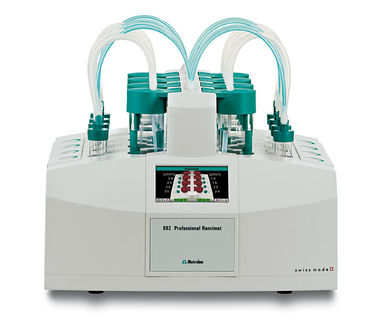Beta adrenergic receptor kinase-2
| Adrenergic, beta, receptor kinase 2
|
| Identifiers
|
| Symbol(s)
| ADRBK2; BARK2; GRK3
|
| External IDs
| OMIM: 109636 MGI: 87941 Homologene: 21072
|
| Gene Ontology
|
| Molecular Function:
| • nucleotide binding
• G-protein coupled receptor kinase activity
• signal transducer activity
• ATP binding
• transferase activity
|
| Biological Process:
| • protein amino acid phosphorylation
• signal transduction
|
|
| RNA expression pattern
|
|
More reference expression data
|
| Orthologs
|
|
| Human
| Mouse
|
| Entrez
| 157
| 320129
|
| Ensembl
| ENSG00000100077
| ENSMUSG00000042249
|
| Uniprot
| P35626
| Q8BVT9
|
| Refseq
| NM_005160 (mRNA)
NP_005151 (protein)
| NM_001035531 (mRNA)
NP_001030608 (protein)
|
| Location
| Chr 22: 24.29 - 24.45 Mb
| Chr 5: 113.15 - 113.26 Mb
|
| Pubmed search
| [1]
| [2]
|
Adrenergic, beta, receptor kinase 2, also known as ADRBK2, is a human gene.[1]
The beta-adrenergic receptor kinase specifically phosphorylates the agonist-occupied form of the beta-adrenergic and related G protein-coupled receptors. Overall, the beta adrenergic receptor kinase 2 has 85% amino acid similarity with beta adrenergic receptor kinase 1, with the protein kinase catalytic domain having 95% similarity. These data suggest the existence of a family of receptor kinases which may serve broadly to regulate receptor function.[1]
Beta adrenergic receptor kinase-2 (ARBK2, BARK-2, G-protein-coupled receptor kinase 3, GRK3) is an intracellular enzyme that phosphorylates G protein-coupled receptors. It was cloned from mice and rats in 1991,[2]. The human gene was cloned in 1993.[3]
In 2003, a group of American and Canadian researchers published a paper that used gene linkage techniques to identify a mutation in the GRK3 gene as a possible cause of up to 10% of cases of bipolar disorder.[4] Beta adrenergic receptor kinase-2 appears to affect dopamine metabolism.
Subsequent studies, while noting that chromosome 22q12 may harbor a risk gene for schizophrenia, did not find that the gene coding for beta adrenergic receptor kinase-2 was linked to schizophrenia.[5]
References
- ^ a b Entrez Gene: ADRBK2 adrenergic, beta, receptor kinase 2.
- ^ Benovic, J. L. (1991). ""Cloning, expression, and chromosomal localization of beta-adrenergic receptor kinase 2: a new member of the receptor kinase family"". J. Biol. Chem. 266: 14939-14946.
- ^ Parruti, G. (1993). ""Molecular cloning, functional expression and mRNA analysis of human beta-adrenergic receptor kinase 2."". Biochem. Biophys. Res. Commun. 190: 475-481.
- ^ Barrett, T B (2003). ""Evidence that a single nucleotide polymorphism in the promoter of the G protein receptor kinase 3 gene is associated with bipolar disorder"". Molecular Psychiatry 8: 546-557.
- ^ Yu, SY (2004). ""Mutation screening and association study of the beta-adrenergic receptor kinase 2 gene in schizophrenia families."". Psychiatry Res. 125: 95-104.
Further reading
- Benovic JL, Onorato JJ, Arriza JL, et al. (1991). "Cloning, expression, and chromosomal localization of beta-adrenergic receptor kinase 2. A new member of the receptor kinase family.". J. Biol. Chem. 266 (23): 14939-46. PMID 1869533.
- Calabrese G, Sallese M, Stornaiuolo A, et al. (1995). "Chromosome mapping of the human arrestin (SAG), beta-arrestin 2 (ARRB2), and beta-adrenergic receptor kinase 2 (ADRBK2) genes.". Genomics 23 (1): 286-8. doi:10.1006/geno.1994.1497. PMID 7695743.
- Parruti G, Ambrosini G, Sallese M, De Blasi A (1993). "Molecular cloning, functional expression and mRNA analysis of human beta-adrenergic receptor kinase 2.". Biochem. Biophys. Res. Commun. 190 (2): 475-81. PMID 8427589.
- Oppermann M, Freedman NJ, Alexander RW, Lefkowitz RJ (1996). "Phosphorylation of the type 1A angiotensin II receptor by G protein-coupled receptor kinases and protein kinase C.". J. Biol. Chem. 271 (22): 13266-72. PMID 8662816.
- Premont RT, Claing A, Vitale N, et al. (1998). "beta2-Adrenergic receptor regulation by GIT1, a G protein-coupled receptor kinase-associated ADP ribosylation factor GTPase-activating protein.". Proc. Natl. Acad. Sci. U.S.A. 95 (24): 14082-7. PMID 9826657.
- Oppermann M, Mack M, Proudfoot AE, Olbrich H (1999). "Differential effects of CC chemokines on CC chemokine receptor 5 (CCR5) phosphorylation and identification of phosphorylation sites on the CCR5 carboxyl terminus.". J. Biol. Chem. 274 (13): 8875-85. PMID 10085131.
- Dunham I, Shimizu N, Roe BA, et al. (1999). "The DNA sequence of human chromosome 22.". Nature 402 (6761): 489-95. doi:10.1038/990031. PMID 10591208.
- Inngjerdingen M, Damaj B, Maghazachi AA (2000). "Human NK cells express CC chemokine receptors 4 and 8 and respond to thymus and activation-regulated chemokine, macrophage-derived chemokine, and I-309.". J. Immunol. 164 (8): 4048-54. PMID 10754297.
- Celver JP, Lowe J, Kovoor A, et al. (2001). "Threonine 180 is required for G-protein-coupled receptor kinase 3- and beta-arrestin 2-mediated desensitization of the mu-opioid receptor in Xenopus oocytes.". J. Biol. Chem. 276 (7): 4894-900. doi:10.1074/jbc.M007437200. PMID 11060299.
- Blaukat A, Pizard A, Breit A, et al. (2001). "Determination of bradykinin B2 receptor in vivo phosphorylation sites and their role in receptor function.". J. Biol. Chem. 276 (44): 40431-40. doi:10.1074/jbc.M107024200. PMID 11517230.
- Wang J, Guan E, Roderiquez G, et al. (2002). "Role of tyrosine phosphorylation in ligand-independent sequestration of CXCR4 in human primary monocytes-macrophages.". J. Biol. Chem. 276 (52): 49236-43. doi:10.1074/jbc.M108523200. PMID 11668182.
- Obara K, Arai K, Tomita Y, et al. (2002). "G-protein coupled receptor kinase 2 and 3 expression in human detrusor cultured smooth muscle cells.". Urol. Res. 29 (5): 325-9. PMID 11762794.
- Mandyam CD, Thakker DR, Christensen JL, Standifer KM (2002). "Orphanin FQ/nociceptin-mediated desensitization of opioid receptor-like 1 receptor and mu opioid receptors involves protein kinase C: a molecular mechanism for heterologous cross-talk.". J. Pharmacol. Exp. Ther. 302 (2): 502-9. doi:10.1124/jpet.102.033159. PMID 12130708.
- Strausberg RL, Feingold EA, Grouse LH, et al. (2003). "Generation and initial analysis of more than 15,000 full-length human and mouse cDNA sequences.". Proc. Natl. Acad. Sci. U.S.A. 99 (26): 16899-903. doi:10.1073/pnas.242603899. PMID 12477932.
- Barrett TB, Hauger RL, Kennedy JL, et al. (2004). "Evidence that a single nucleotide polymorphism in the promoter of the G protein receptor kinase 3 gene is associated with bipolar disorder.". Mol. Psychiatry 8 (5): 546-57. doi:10.1038/sj.mp.4001268. PMID 12808434.
- Ota T, Suzuki Y, Nishikawa T, et al. (2004). "Complete sequencing and characterization of 21,243 full-length human cDNAs.". Nat. Genet. 36 (1): 40-5. doi:10.1038/ng1285. PMID 14702039.
- Dzimiri N, Muiya P, Andres E, Al-Halees Z (2005). "Differential functional expression of human myocardial G protein receptor kinases in left ventricular cardiac diseases.". Eur. J. Pharmacol. 489 (3): 167-77. doi:10.1016/j.ejphar.2004.03.015. PMID 15087239.
- Teli T, Markovic D, Levine MA, et al. (2005). "Regulation of corticotropin-releasing hormone receptor type 1alpha signaling: structural determinants for G protein-coupled receptor kinase-mediated phosphorylation and agonist-mediated desensitization.". Mol. Endocrinol. 19 (2): 474-90. doi:10.1210/me.2004-0275. PMID 15498832.
- Feng YH, Wang L, Wang Q, et al. (2005). "ATP stimulates GRK-3 phosphorylation and beta-arrestin-2-dependent internalization of P2X7 receptor.". Am. J. Physiol., Cell Physiol. 288 (6): C1342-56. doi:10.1152/ajpcell.00315.2004. PMID 15728711.
- Rual JF, Venkatesan K, Hao T, et al. (2005). "Towards a proteome-scale map of the human protein-protein interaction network.". Nature 437 (7062): 1173-8. doi:10.1038/nature04209. PMID 16189514.
|







